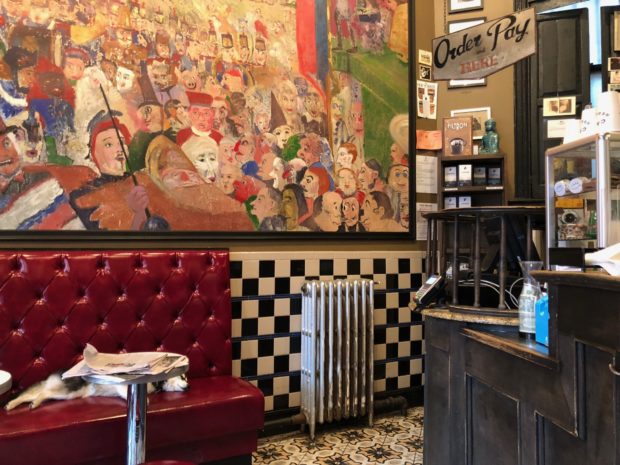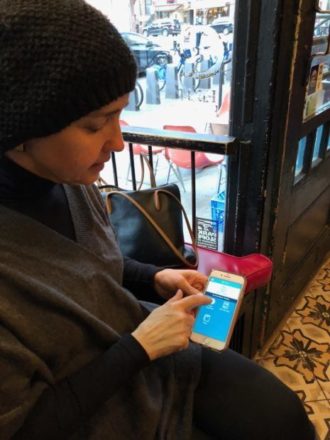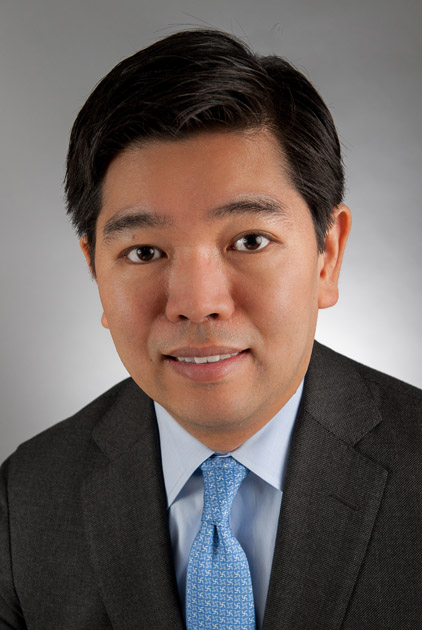Our appointment takes place in a minuscule café in Park Slope, Brooklyn – a place that seems like it came out of another place and time, with black and white tiles and a bright red love seat. While an unexpected snowfall lightly dusts the street, Jessica Morris enters fast-paced with smiling eyes from the glass door. “Sorry I’m late!”, she tells us. “I was at Columbia University today; it’s been a long, long day”.

Jessica is an elegant 54-year-old woman from London. She speaks that type of British English which makes most Americans envious. On January 23, 2016, she discovered that she was afflicted with a rare form of brain cancer, glioblastoma, also known as GBM or glioblastoma multiforme. In the United States, 18 thousand people a year discover to have this form of cancer, for which a cure still has not been discovered. More attention has been given to GBM recently, as it has also struck Senator John McCain, to whom which Jessica Morris reached out in an Op-Ed article published by The New York Times. The average life expectancy after diagnosis is on average 14 months, but only if you undergo chemotherapy and radiation therapy. Only 1 in 20 people live beyond the average. Jessica Morris is one of those people. And in March 2018, in collaboration with about ten people, including patients, doctors and researchers, she launched the start-up OurBrainBank, which she founded.

It’s a smartphone app that tracks the daily symptoms of patients stricken by glioblastoma through simple questions on the patient’s daily health condition: “How do you feel today on a scale of 1 to 5?”, “Did you do any physical activity today?”, “How much did you sleep last night?”, “How tired do you feel on a scale of 1 to 5?”. Or through mental exercises, such as the “Speed Test”, the “Stability Test” and the “Match Test”. The data that emerge from the patient’s responses are filed into a personal profile, so that the patient may directly refer back to them. However, they are also gathered, anonymously — protecting the identity of the person that created them – in a secure open source database where academics, researchers and university professors can have access to them. The objective of the app is two-fold: to shed light on a type of cancer that we still know too little about, and to facilitate research to arrive more quickly and more cost effectively to a cure that today does not exist.
“I discovered I had cancer during a trip to Upstate New York one day” Jessica explains to us while we are seated at a small table, with a view of Berkeley PI. “I didn’t feel well. But I couldn’t speak, I wasn’t able to communicate what I was feeling to the people that were around me. Then, everything went dark; all of a sudden, I passed out. They diagnosed me with glioblastoma and they operated on me two days later. The shock of it all lasted much longer”. Born and raised in London, with a university degree in History from Cambridge and with a carrier launched as a Strategic Communications Consultant in New York where she’s been living since 2006, Jessica is married and has three children, 20, 18 and 15 years old. She lives in Park Slope, right by the Café Regular du Nord where we meet: “The days following the operation, during the chemo and the radiotherapy, were terrible. I remember that sometimes I would wake up in the middle of the night in my bedroom thinking, ‘Death is coming, Jessica. Who would have ever thought that one day I would have been able to think such a thing with such certainty? Damn it!’. It was tragic”. But, thanks to a “strong family” and “a neighborhood full of extraordinary friends that warmly supported me”, Jessica found motivation. And fast.

“I decided to treat my aggressive cancer with the same aggressiveness: I understood that I didn’t have – and don’t have – literally anything left to lose”. Jessica therefore begins to “use the brain to fight my brain cancer”. And with her doctor, Fabio Iwamoto, Deputy Head of Neuro-Oncology at Columbia University, she put down the foundation for the OurBrainBank project.
“Everything started when I asked him why there still wasn’t a cure for this type of cancer. He told me that the problems were generally tied to the rarity of the cancer type, which makes it more difficult to collect funds for research”. Whoever finances these projects, in fact, is discouraged to do so right from the beginning because of the speed with which the disease develops. And only 5% of the applications for glioblastoma fundraising are successful: “I thought that behind those 18 thousand cases of GBM a year there weren’t only patients, but people”. And that through technology it would be possible to sustain the few data gathered from today’s expensive therapies, with a much simpler method — tracking people’s daily lives through a technological device on the smartphone: “I said to myself, What would happen if we could capture the data of patients’ life experiences every day, for free, putting them into a system with an objective monitoring system of the MRIs that we already undergo and the treatment that already exists?”. This is how the OurBrainBank idea was born. “The system already existed and had been developed by an IT company based in London, uMotif, but it hadn’t yet been funneled into the startup project that we had developed afterwards, coordinated with uMotif”. Thanks to Jessica’s work, in collaboration with Doctor Fabio Iwamoto, Adam Hayden (a patient also afflicted with GBM from June 2016), Bruce Hellman (Chief Executive of uMotif) and Asaf Danziger (Chief Executive Officer of Novocure, the pioneering company in the battle against TTF-type tumors), on March 13, 2018 the new application was launched, available for free on Apple and Google Android devices. For now, it can be downloaded only in the United States. But the aim of the founders is to make it available soon everywhere. And according to their expectations, over a thousand people will begin using it during the first year of its availability: “We published a research study on our Facebook page related to the launch of the application, and after 48 hours, we had 115 responses. It was an encouraging start”, stated Jessica.


The challenge now with OurBrainBank, of which the data gathered will be made available to all of the GBM research centers in the world, after an approval process of the OurBrainBank Data Committee, is that of finding new investors to amplify the application. And to convince the centers to implement funding for glioblastoma research: “The problem with the funds is an absolute extenuating circumstance – states Doctor Fabio Iwamoto, co-founder of the startup, to La Voce di New York. The budget has to be implemented, even through a decisive increase in federal funds”. For Iwamoto, “the key is all in the research; for too much critical time and individual insight steered by the patients has been lacking”. And OurBrainBank has “the capacity to intercept precisely this criticality, this gap. It is a project that has the potential to have a real impact on our capacity to increase patients’ life expectancy”. While outside this pretty Park Slope café it has stopped snowing, we ask Jessica what it means to treat cancer in a country like the United States, which considers health care a service and not a right. “It’s truly critical. I am very fortunate, because my health insurance covers the majority of my treatments and I am receiving the best treatment in the world”, reflects Jessica, as she continues to sip her cappuccino. “But I think — she continues – about how many live isolated, perhaps in a small town in the Midwest, far away from everyone and everything: do you know that 85% of people who are diagnosed with this cancer don’t even go see a specialist because they don’t even know that one exists? And if you don’t see a specialist, you’re already done from the get-go”. Among the objectives of OurBrainBank, there is not for nothing one to strengthen the community of people afflicted with this cancer. Women and men physically far away, that must be contacted online to compare symptoms and treatments: “One of the tools that you find in the app is a forum open to everyone who has signed up, in which you can write to each other, and where you can remain in contact with each other”, explains Jessica. “For those who get sick with cancer, the sense of community, the feeling of belonging to a group of people that, near or far, are in contact with you and understand you, is fundamental”. And to make doctors understand that an app or a Facebook social page can be of help, is another challenge to overcome: “When I spoke about this project in the beginning, many doctors were skeptical and told me, ‘People don’t want to talk about their illness, an app of this kind will never be used because patients don’t want to share’. I was puzzled, because it’s not like that”. And to confirm this there is also Adam Hayden, one of the co-founders of the app, who is also sick with GBM: “OurBrainBank elevates the individual person that lives with this cancer on the hinge of a process that could improve research on the disease with which he or she is afflicted”, he states to La Voce di New York. In fact, whoever uses the app is helping himself or herself through the exercises and the daily diagnoses on his or her actual state of health. And not only: “The people afflicted with GBM are mixed, just like the illness. Encouraging the patients’ data, you encourage medical advice and cancer research through a unique and innovative contribution, which would never take place in the labs without the patients’ direct involvement. OurBrainBank is more than an app, it’s a means that opens new scenarios to research methods”.

A research that, notwithstanding all of the difficulties faced and the scarce funding, continues to move forward. In a study published in the magazine Cancer Cell in September 2017, a group of researchers from Massachusetts Institute of Technology (MIT) in Boston announced that it had discovered the mechanism that brings a specific protein called PRMT5 to grow the glioblastoma. The MIT researches, guided by Dr. Christian Braun, were able to stunt the growth of the cancer in mice, blocking the mechanism connected with the PRMT5 protein, through the use of a series of drugs already available on the market. A promising step ahead, but still insufficient: “The mission of our application is that of creating the prerequisites to improve the treatment of this cancer and to motivate centers to utilize their finances for research, even more so”, Jessica Morris tells us. “Twelve years ago, you could survive glioblastoma for maybe a few months; today, there is hope up to 5 years. I dream of a world in which in twelve years, in 2030, whoever is diagnosed with glioblastoma will be aware that they have been afflicted with a curable cancer, not a terminal one”. And to those who discover to be afflicted with it today instead, what does Jessica have to say? “I know, I’m going to say the classical cliché on the meaning of life that you may have all read and heard so many times. But really do it: live in the moment, live what you have and concentrate on what your challenges are today. And when you discover a cancer like glioblastoma, share your symptoms. Somewhere in the country and the world over, there is someone who is facing your same challenge: let’s find each other, let’s help each other”.
Translated by Emmelina De Feo












